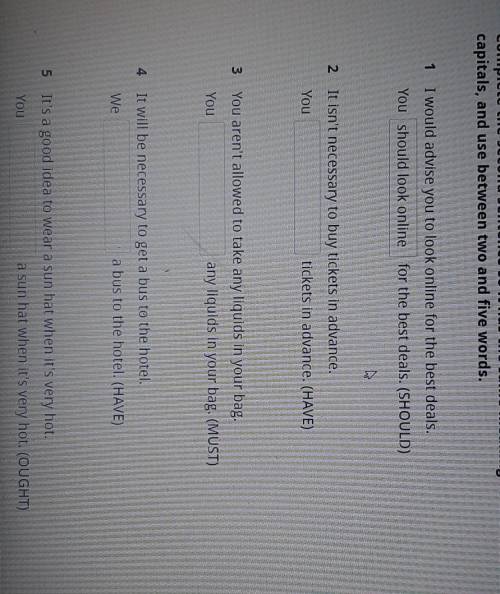1I would advise you to look online for the best deals. You
should look online
for the best deals. (SHOULD)
2It isn't necessary to buy tickets in advance.
You
tickets in advance. (HAVE)
3You aren't allowed to take any liquids in your bag.
You
any liquids in your bag. (MUST)
4It will be necessary to get a bus to the hotel.
We
a bus to the hotel. (HAVE)
5It's a good idea to wear a sun hat when it's very hot.
You
a sun hat when it's very hot. (OUGHT)

Другие вопросы по теме Английский язык
Популярные вопросы
- Характеристика багіри з казки мауглі...
3 - Какая из комнат имеет больший объём? у какой из них больше площадь...
2 - Решить: для 1 литра водорода (н.у.) рассчитайте а)массу б)количество...
3 - Бассейн наполняется через первую трубу на 5 часов быстрее, чем...
2 - Ритуал начинается с того, что шаман кладёт 1 камень в первое блюдце,...
1 - Мне нужно сочинение на одну из тем : травки как митраша попал в...
3 - Длина экватора луны приближённо равна 10,9 тыс. км. чему равен...
1 - Через 16 лет семен будет втрое старше. чем теперь .сколько лет...
1 - 2)радиус первой окружности равен 6,8 см, а диаметр второй 21см.найдите...
2 - Масса сушеных грибов составляет одну десятую часть массы свежих...
2
"Should" is used to express advice or recommendations. In this sentence, the speaker is giving advice to someone to look online for the best deals. Looking online is suggested as the best course of action.
2. It isn't necessary to buy tickets in advance. You have to buy tickets in advance. (HAVE)
"Have to" is used to express obligation or necessity. In this sentence, the speaker is telling someone that they must buy tickets in advance. Buying tickets in advance is necessary in this situation.
3. You aren't allowed to take any liquids in your bag. You must not take any liquids in your bag. (MUST)
"Must" is used to express prohibition or to say that something is not allowed. In this sentence, the speaker is telling someone that they are not allowed to take any liquids in their bag. Taking liquids in the bag is prohibited.
4. It will be necessary to get a bus to the hotel. We have to take a bus to the hotel. (HAVE)
"Have to" is used to express obligation or necessity. In this sentence, the speaker is saying that taking a bus to the hotel is necessary. Taking a bus is the best option or the only available option.
5. It's a good idea to wear a sun hat when it's very hot. You ought to wear a sun hat when it's very hot. (OUGHT)
"Ought to" is used to express recommendations or suggestions, similar to "should." In this sentence, the speaker is suggesting that wearing a sun hat is a good idea when it's very hot. Wearing a sun hat is recommended in such weather conditions.
The use of modal verbs like "should," "have to," "must," and "ought to" can help convey different meanings and give advice or express obligations. It is important to understand their usage in order to effectively communicate and understand instructions or recommendations.